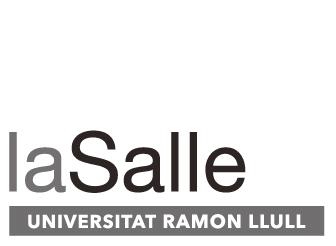- Home/
- Bachelor's Degree in Medicine
Bachelor's Degree in Medicine
Enrolment open

- ModalityIn-person
- LanguagesCatalan, Spanish, English
- Duration6 academic years
- Credits360
- DateSeptember 2026
- Planning
Classes in the morning (9 a.m. to 2 p.m.), with some laboratory days in the afternoon.
From the third year onwards, classes will be held in the afternoon (2 p.m. to 7 p.m.).
- Location
Campus Salut Blanquerna-URL (Padilla, 326 i Travessera de Gràcia, 401)
- Faculty
Blanquerna School of Health Sciences
Presentation
The future Bachelor's Degree in Medicine will be built on three fundamental pillars that address the challenges of 21st-century medicine: technology, humanism, and social commitment. This innovative approach we plan to implement ensures comprehensive training that combines scientific knowledge with the personal and social dimensions of medical practice.
We aim to equip medical students with the knowledge and skills necessary to become professionals with a comprehensive view of health. The doctor we plan to train will have up-to-date technical preparation in the technological field and a deeply human education, enabling them to approach patient care with sensitivity and empathy.
Who is it for?
The recommended entry profile for the future Bachelor's Degree in Medicine at Universitat Ramon Llull will correspond to candidates motivated to acquire the knowledge and develop the skills necessary to diagnose, treat, and prevent diseases, as well as to promote the health and well-being of individuals and the community. They should have a deep interest in understanding the biological, psychological, and social aspects of health, social awareness and a vocation for serving others, strong ethical values, and respect for patients’ rights.
The objectives and competencies of the Bachelor's Degree in Medicine are those established in Order ECI/332/2008, of February 13, which sets the requirements for the verification of official university degrees that qualify for the practice of the medical profession.
Major areas for professional development
- Access to specialized medical training (MIR), which qualifies professionals to practice medicine in various areas of the public or publicly funded healthcare sector (primary care, hospital care, long-term and social care, mental health), in hospitals, primary care teams, long-term care centers, mental health facilities, emergency medical transport services, and other healthcare services.
- Self-employed medical practice, either in a private medical office or as part of the medical staff in privately owned hospitals, mutual insurance organizations, or private insurance companies. Private practice is a career option for physicians who wish to work in this field, either as their main professional activity or as a complement to practicing in the public healthcare system.
- International organizations such as the WHO or Doctors Without Borders.
- University teaching and/or teaching at various academic levels and settings related to health sciences education.
- Research in universities and/or within public administrations, as well as in public health centers and institutions.
If you choose the future Bachelor's Degree in Medicine at Universitat Ramon Llull, you choose…
- A strong and strategic commitment by URL, led by the Blanquerna-URL Faculty of Health Sciences with the close, committed, and integrated collaboration of other Ramon Llull University centers such as IQS, La Salle, Esade, the Borja Institute of Bioethics, and the Vidal i Barraquer University Institute of Mental Health.
- A prominent leading hospital network in our country, including the Quirónsalud group (Hospital Quirónsalud Barcelona, Hospital El Pilar, and Hospital Quirónsalud Badalona); Fundación Hospitalarias (Barcelona, Barcelona Nord, Martorell, and Sant Boi); Germanes Hospitalàries Research Foundation (FIDMAG); and the health centers CAP Vallcarca, CAP Sant Gervasi, and EAP Dreta de l’Eixample - CAP Roger de Flor.
- A comprehensive education based on values, knowledge, and skills, combining the latest technological and scientific advances with a humanistic approach.
*Pending approval by the Council of Universities
A unique methodology based on personalized learning.
Personalized attention
Relevant partners
Leadership training
Three distinguishing features of the future degree:
Advanced scientific and technological knowledge (high tech)
Strong humanistic education and utmost care in the doctor–patient relationship (high touch)
Strong commitment to comprehensive care of the individual and their health throughout life, as well as to the needs of our society (high commitment).
An integrated knowledge network
A determined and strategic commitment by the URL, led by the Blanquerna-URL Faculty of Health Sciences, with the close, committed, and integrated collaboration of other centers of Ramon Llull University.
Curriculum
We have designed a curriculum that combines training in cutting-edge technology with closeness and humanity in patient care.
Credits
| First | Second | Third | Fourth | Fifth | Sixth | Total | |
| Practicum | 12 | 12 | 12 | 15 | 51 | ||
| Final degree project | 9 | 9 | |||||
| Core curriculum | 60 | 30 | 90 | ||||
| Compulsory | 27 | 48 | 48 | 45 | 33 | 201 | |
| Optional | 3 | 3 | 3 | 9 | |||
| Total | 60 | 60 | 60 | 60 | 60 | 60 | 360 |
| Subject | |||
| First semester | |||
| Basic principles and skills in medicine | 6 | Core curriculum | |
| ENG/Bioquímica | 6 | Core curriculum | |
| ENG/ Biología celular | 6 | Core curriculum | |
| ENG/ Anatomía general y embriología | 6 | Core curriculum | |
| ENG/ Fundamentos humanísticos de la medicina I | 6 | Core curriculum | |
| Second semester | |||
| ENG/ Introducción a la fisiología | 6 | Core curriculum | |
| ENG/Medicina basada en la evidencia y bioestadística | 6 | Core curriculum | |
| ENG/ Biologia molecularBiologia molecular | 6 | Core curriculum | |
| ENG/ Genética | 6 | Core curriculum | |
| ENG/ Psicología | 6 | Core curriculum |
| Subject | |||
| Third semester | |||
| ENG/ Histología | 6 | Core curriculum | |
| ENG/ Neuroanatomía y neurofisiología | 6 | Core curriculum | |
| ENG/ Anatomía y fisiología del aparato respiratorio | 6 | Core curriculum | |
| ENG/ Anatomía y fisiología del aparato cardiovascular | 6 | Core curriculum | |
| ENG/Fundamentos humanísticos de la medicina II | 3 | Compulsory | |
| ENG/Optativa I | 3 | Optional | |
| Fourth semester | |||
| ENG/Farmacología | 6 | Compulsory | |
| ENG/Anatomía patológica | 6 | Compulsory | |
| ENG/Microbiología y fisiopatología de la infección | 6 | Compulsory | |
| ENG/Comunicación y relación médico-paciente | 6 | Core curriculum | |
| ENG/Medicina y salud digital | 6 | Compulsory |
| Subject | |||
| Fifth semester | |||
| ENG/Semiología y razonamiento clínico | 6 | Compulsory | |
| ENG/ Diagnóstico por la imagen, radioterapia y procedimientos terapéuticos | 9 | Compulsory | |
| ENG/ Cirugía general y anestesiología | 6 | Compulsory | |
| ENG/Fundamentos humanísticos de la práctica profesional | 3 | Compulsory | |
| Sixth semester | |||
| ENG/Patología médico-quirúrgica endocrinológica, nutrición y dietoterapia | 6 | Compulsory | |
| ENG/Patología médicoquirúrgica del aparato digestivo | 6 | Compulsory | |
| ENG/Neurología y neurocirugía | 6 | Compulsory | |
| ENG/Nefrología y urología | 6 | Compulsory | |
| Annual | |||
| ENG/Prácticas externas I | 12 | Internships |
| Subject | |||
| Seventh semester | |||
| ENG/Patología médico-quirúrgica cardiológica y del aparato respiratorio | 9 | Compulsory | |
| ENG/Clínica integrada I: genética clínica, reumatología e inmunología I | 9 | Compulsory | |
| ENG/Oftalmología | 6 | Compulsory | |
| Eighth semester | |||
| ENG/Enfermedades infecciosas | 6 | Compulsory | |
| ENG/Dermatología | 6 | Compulsory | |
| ENG/Psiquiatría y salud mental | 6 | Compulsory | |
| ENG/Otorrinolaringología | 6 | Compulsory | |
| Annual | |||
| ENG/Prácticas externas II | 12 | Internships |
| Subject | |||
| Nineth semester | |||
| ENG/Ginecología y obstetricia | 6 | Compulsory | |
| ENG/Traumatología, ortopedia y rehabilitación | 9 | Compulsory | |
| ENG/Medicina familiar y comunitaria | 6 | Compulsory | |
| Tenth semester | |||
| BIOMEDICAL RESEARCH | 3 | ||
| ENG/Pediatría | 9 | Compulsory | |
| ENG/ Clínica integrada II: oncología, hematología e inmunología II | 9 | Compulsory | |
| ENG/Cuidados paliativos, cronicidad y envejecimiento | 6 | Compulsory | |
| Annual | |||
| ENG/Prácticas externas III | 12 | Internships |
| Subject | |||
| Eleventh semester | |||
| ENG/Inteligencia artificial y robótica en salud | 6 | Compulsory | |
| ENG/Gestión sanitaria y liderazgo clínico | 6 | Compulsory | |
| ENG/Medicina preventiva, salud pública y salud planetaria | 6 | Compulsory | |
| Elective II | 3 | Compulsory | |
| Optativa III | 3 | ||
| Twelfth semester | |||
| ENG/Medicina intensiva, urgencias y emergencias | 6 | Compulsory | |
| ENG/Bioética, medicina legal y toxicología | 6 | Compulsory | |
| ENG/Trabajo de fin de grado | 9 | Final degree project | |
| Annual | |||
| ENG/Prácticas externas IV | 15 | Internships |
We make it easy, so you can choose whatever you want to study
Payment for the studies is made in instalments and without any interest. At the time of enrolment, 20% of the total cost of the registered credits* is paid; in May, 10% of the total cost is paid; and the remaining 70% is divided into nine monthly payments (from October to June) via direct debit.
The tuition fee / credit of degrees is regularized each academic year for all courses.
Tuition fee for the 2026–27 academic year
Discounts for bachelor's degrees from Blanquerna-Ramon Llull University
Fundació Blanquerna discounts (not cumulative with each other):
- Student member of a large or single-parent family: 5% discount.
- Student with disability >33%: 5% discount.
- Blanquerna family (student, child, sibling or partner, student): 5% discount. Anyone who has completed an official degree will be considered an Alumni.
In order to apply the discount, you must prove it with the corresponding document. Students must bring the original document in person to the Academic Secretariat, together with their identification document, for validation and application of the corresponding discount.
The deadline for submitting the supporting documentation for the 2026-2027 academic year is September 30, 2026.

Closeness, professionalism, and humanism
- Access to specialized healthcare training (MIR), which qualifies for the practice of medicine in various areas of the public or semi-public sector (primary care, hospital care, social and healthcare, mental health) in hospitals, primary care teams, social and healthcare centers, mental health centers, emergency medical transport services, and other healthcare facilities.
- Practice of the profession on a self-employed basis, either in a private medical practice or as part of the medical staff of privately owned hospitals, mutual insurance companies, or private insurers. Private practice is a work option for doctors who wish to carry out their professional activity in this field, either as their main occupation or as a complement to practicing public medicine.
- International organizations such as the WHO or Doctors Without Borders.
- University teaching and/or teaching at various levels and academic settings related to health sciences education.
- University research and/or research in public administrations, centers, and public health institutions.
State-of-the-art equipment at the student's disposal
Theoretical-practical classrooms and clinical simulation
Putting theory into practice is key to gaining knowledge. In the case of nursing, it is a key aspect before dealing with patients. The faculty has simulation classrooms to prepare students for clinical interventions.
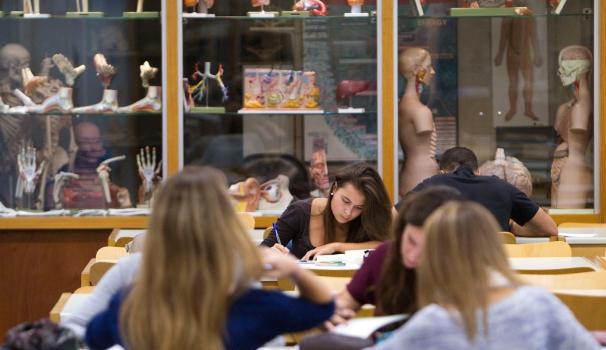
Anatomy room. Osteoteca
This room has teaching resources so that students can become familiar with the human body, identify and locate muscles, bones, arteries, veins or nerves.
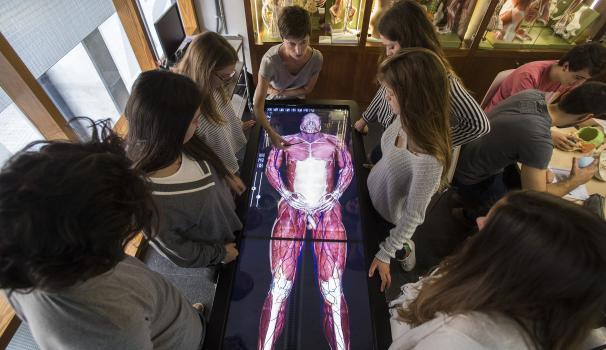
Anatomy
See human anatomy in its entirety on a real scale and in 3D. This is the reality that allows the anatomy, an interactive display table to see any anatomical system of the human body.
Libraries
If you need a quiet space to study or to do individual and group work, come to the library! Each school has its own library with computers, workrooms, reading points and an extensive catalog of documents you can consult in both hard copy and digital format.
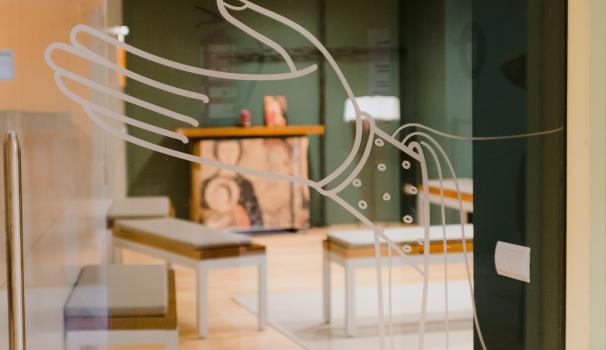
Chapel
The chapel is the right place to find recollection, peace, to focus, to pray and to celebrate the Eucharist weekly and at important liturgical moments (Christmas, Ash Wednesday and Easter). The sacrament of reconciliation is also celebrated.
All the services you need during your time at the School.
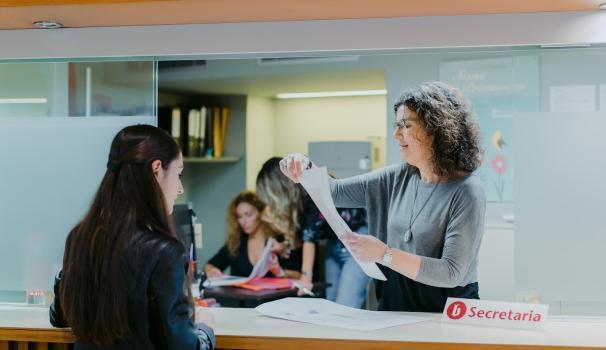
Academic Secretary
The Academic Secretaries of the Blanquerna faculties are the space for students to relate to the processes linked to the registration of official and own courses.
Internship service
Professional experience is a core part of our methodology. For this reason, we have a broad spectrum of internship agreements to meet the needs and preferences of all students. You will graduate having worked in your industry.

Scholarships and grants service
At Blanquerna, we put the future within everyone's reach thanks to our scholarships and grant service to start or continue studying at our schools. Financial aid is both internal and external to the university. You will find a wide range of possibilities.

International Mobility Office
Going abroad is a unique opportunity to discover the plurality of the world. Aware of the importance of the internationalization of studies, we have established mobility agreements around the world.
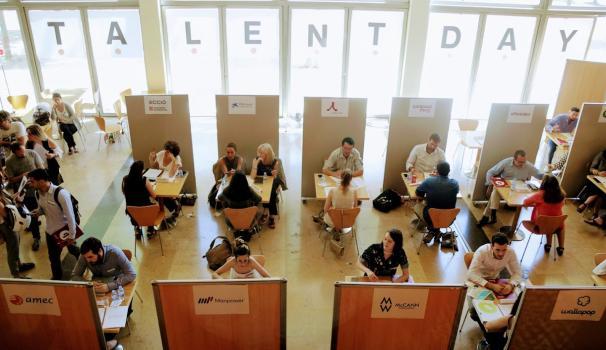
Careers
This service provides graduates with the necessary means so that they can actively participate in their professionalism and propose optimal candidates to organizations and companies looking for staff.

Job Bank
The leap into the world of work is always a challenge. For this reason, we provide a Job Bank for students and graduates. This service puts students in touch with companies and institutions looking for staff.
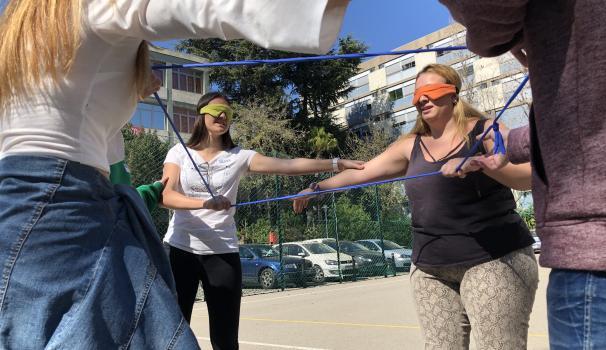
Solidarity action
Solidarity and the struggle for human dignity are values that identify us. Solidarity Action is a volunteer program that our students can join to participate in projects in the Third and Fourth World.

Alumni service
Studying in Blanquerna allows you to be part of our community. Being a college student opens the door to a lot of options for continuing your vocational training beyond your time in the classroom.

Sports service
Want to represent the URL in college sports tournaments? You can find a wide range of possibilities for both individual and team sports. To be a student of Blanquerna, you will have a discount at the Can Caralleu and La Salle Sport & Fitness sports complexes.

Personal Guidance Service (SOP)
If you are in a difficult situation in the academic, personal or social field, you can request, free of charge, the personalized attention of the SOP. This is an interdisciplinary team of professionals who will guide you in dealing with the situation.
Faith and Spirituality
In the three Blanquerna faculties, you will find spaces for reflection isolated from the hustle and bustle dedicated to the celebration of the Faith or cultural and religious animation. If you wish, you can also receive personalized attention and information about church life.
Diversity support
At Blanquerna we promote personal development at all levels to people with a diversity of specific needs from a normalizing context that encourages personal autonomy and uniqueness.
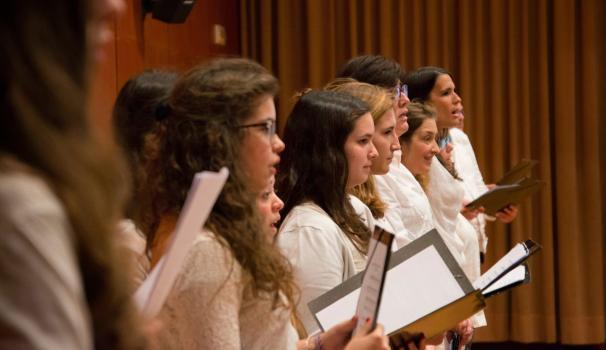
Blanquerna Choir
If you like music and want to take part in the concerts of institutional events and festivities, sign up for the Blanquerna Choir. There you will meet new friends and enjoy music.

Student representatives
Each class group must elect a representative to put forward concerns or make proposals to the faculty members and academic management. At the same time, each degree must appoint a delegate and each school a representative on the general URL council.
Student Council
Contact between students and the university is constant and is channeled through the Student Council, the body that collects proposals and requests from students and facilitates university life.

Language support service
Are you studying a foreign language and want to improve your level? Do it at your own pace in the language self-learning classroom. This service offers various teaching resources and materials to practice the language.
Application for admission
The application process for a place in the 2026-2027 academic year begins on October 31, 2025, and consists of three phases:
- Application for admission
- Admission
- Enrollment
1. Application for admission
The application for a place can be made online or in person and entitles the applicant to participate in the admission process.
It can be done via the Application for admission button on the page for each degree, or directly from here, and requires:
- Registering in the single registration system and creating a user account (if not done previously).
- Making a payment of €50 (non-refundable) for admission rights and procedures. This can be done with a credit or debit card through a secure and confidential process with BBVA bank.
- Uploading the documentation to the document repository before the deadline for the place application process.
- Identification document (DNI, NIE, Passport)
- Certification of university entrance qualifications (PAU (University Entrance Exams), CFGS (Higher-Level Vocational Training), International Baccalaureate Diploma, etc.) if available at the time of applying for a place.
In order to calculate the admission grade, applicants to the Medicine degree must upload to the document repository an official certificate with their Baccalaureate grade (first year or complete) / PAU / CFGS / CAO*.
*CAO: Official Academic Certificate. To be submitted by those entering the degree with a completed university qualification.
It can be done at the School itself, by going to the Student Information and Guidance Service (SIOE), and the following must be submitted:
- Photocopy of the identification document (DNI, NIE, Passport)
- Photocopy of the certification of university entrance qualifications (PAU (University Entrance Exams), CFGS, International Baccalaureate Diploma, etc.) if available at the time of applying for a place.
- Payment of €50 (non-refundable) for admission rights and procedures. This can be made in cash or with a credit or debit card.
- In order to calculate the admission grade, applicants to the Medicine degree must upload to the document repository an official certificate with their Baccalaureate grade (first year or complete) / PAU / CFGS / CAO*.
*CAO: Official Academic Certificate. To be submitted by those entering the degree with a completed university qualification.
2. Admission
30% based on the Academic record provided by the student: Baccalaureate grade (first year or complete) / PAU / CFGS / CAO
70% based on the Admission Tests
The admission tests for Medicine consist of the following:
Objective test (multiple choice) to assess scientific knowledge and logical reasoning. The knowledge evaluated corresponds to the curricular content covered up to the first year of high school in the areas of Biology, Chemistry, Mathematics, and English, as well as current affairs and general knowledge. (50% of the admission test)
Tests aimed at assessing personal, ethical, and vocational suitability for the degree profile. Test to evaluate reading comprehension. (50% of the admission test)
*The estimated maximum duration is 2 hours and 30 minutes.
The admission tests will take place in person on:
- Saturday, December 13, 2025 (Closed)
- Saturday, February 21, 2026 (Closed)
- Thursday, July 2, 2026
Remember that you must have submitted the application for a place in order to take the test.
Admission to the Medicine degree will be based on the admission grade.
After each test, admitted students will be called to complete enrollment.
To be admitted:
You must have an admission grade of 8 out of 10 or higher (subject to availability of places).
If this criterion does not fill 40% of the offered places, the minimum entry grade (cut-off grade) will be lowered to reach this percentage.
Students who are not admitted in each allocation can apply again in subsequent allocations, keeping their obtained grade.
It is the student's responsibility to have a B2-level proficiency in the language of instruction of the degree in order to follow the classes properly.
3. Enrollment
The student called for enrollment can choose between two options, depending on whether they already have the definitive access route or not.
- Conditional Enrollment
Enrollment in the degree can be completed before passing the PAU or CFGS or before having the access route. The enrollment will be conditional upon submitting the corresponding access route. This option secures the place and allows selecting the class schedule, in degrees with more than one schedule, as long as places are available.
Once enrolled, if the student does not obtain the access route by June, they will have two options:
- The enrollment fee will be refunded, but the student will lose the place and the amount paid for the application (€50).
- If there are available places in July, the student can choose to remain on the waiting list until September and keep the place, but will no longer have priority in selecting the class schedule. If the access route is still not obtained by September, the enrollment fee will be refunded.
- Final enrollment
It will be formalized if, at the time of processing the enrollment, the student already has the university entrance pathway. They may opt for the available places and shifts.
IMPORTANT: Degrees with more than one shift may exhaust places in a specific schedule with conditional enrollment. The required documentation must be uploaded via the Document Repository.
The place will be definitive once the student has submitted the documentation with the final university entrance information and the first enrollment payment has been made.
Studies can be paid upfront and/or in interest-free installments. If payment by installment is selected, upon enrollment the student will have two business days to pay 20% of the total cost of the enrolled credits, using their chosen form of payment; this payment will not be taken by direct debit; in May, 10% of the total cost is paid; and the remaining 70% is divided into nine monthly payments (from October to June) via direct debit.
Prices for each academic year are updated annually.
Once payment is made, the corresponding receipt of enrollment can be viewed in the student's Document Repository and via the student's portal.
International or foreign students
For the foreign student admission process, the following considerations and requirements must be taken into account in accordance with the prevailing regulations.
Students must apply to the Universidad Nacional de Educación a Distancia (UNED) to obtain the credential certifying that they meet the requirements to access university studies within the state education system (UNED Credential). Therefore, they do not need to take the PAU (University Entrance Exams), but without the mentioned credential, they cannot enroll in our degrees.
The education systems that can be accessed through this pathway are: Germany, Andorra, Austria, European Schools (European baccalaureate), International Baccalaureate, Belgium, Bulgaria, Croatia, Denmark, Slovakia, Slovenia, Estonia, Finland, France, Greece, Hungary, Ireland, Iceland, Italy, Latvia, Liechtenstein, Lithuania, Luxembourg, Malta, Norway, the Netherlands, Poland, Portugal, the United Kingdom, the Czech Republic, Romania, Sweden, Switzerland, China and Cyprus.
These students may access our degrees by submitting the homologation of the High School diploma from the Spanish Ministry of Education or from the autonomous communities with transferred competence, such as the Generalitat de Catalunya. Proof of application for convalidation will be sufficient for students to enroll and begin taking a bachelor's degree course, however full enrollment is conditional on convalidation being confirmed. Bear in mind that convalidating studies can take more than three months to complete, so this process should be done in parallel with the admissions process to our bachelor's degrees. If the convalidation resolution is not obtained in the terms requested by the interested party, the results of any exams taken, or the enrollment made as a result thereof, are rendered null and void.
Contact
For any questions or inquiries about the place application or enrollment process, contact [email protected]
Come and meet us!
We look forward to seeing you at the Open Day at the Blanquerna-URL Faculty of Health Sciences (c/ Padilla 326, Barcelona), where you can learn more about our educational program and have all your questions answered.
The next Open Days for the Medicine degree will take place:
- Friday, January 23, 2026
- Thursday, March 26, 2026
The bachelor's degree thesis, the step prior to the labor market
The bachelor's degree thesis is a project that marks the end of the bachelor studies stage. It must be a complete and relevant work, enabling students to integrate the competences, knowledge and skills acquired during their bachelor's degree learning and must be applicable to the professional sphere in any of its aspects.

We help you pay for your studies. A future within everyone's reach.
Find the help that best suits your needs between Blanquerna scholarships and grants, public and private grants or funding grants.
Blanquerna-URL is waiting for you!
Scholarships and grants Blanquerna
Public aid
funding
Internships, an experience to introduce you to the professional world.
At Blanquerna, we place a fundamental emphasis on the training and skills acquired during External Internships. For this reason, we have agreements with a wide variety of organizations, companies, and institutions, where you can apply your theoretical knowledge and the skills gained during prior clinical simulations in a professional setting, beginning to shape your future career based on the realities of the sector.
- Internships in specialized areas, such as Medicine, Surgery, Medical, Surgical, and Medico-Surgical Specialties, Family and Community Medicine, Psychiatry.
- Tutoring and guidance during internships by a clinical tutor and an academic tutor.
- Innovative spaces for reflection and personalized documentation throughout practical learning (briefing, mid-briefing, debriefing, internship dossier).
- Training for clinical tutors on pedagogical tools to ensure excellence in mentoring and evaluating students during internships.
- Possibility of internship programs abroad (ERASMUS and others).
The objectives of the curricular external internships of the Bachelor's Degree in Medicine, following Order ECI/332/2008 of February 13, which sets the requirements for the verification of official university degrees that qualify for the practice of the medical profession, focus on:
- Integrate medical knowledge, skills, and attitudes into professional practice.
- Incorporate professional values, patient communication skills, clinical reasoning, and critical judgment.
- Train students to adapt to new situations and work effectively in teams.
Where will you be able to do the internships?
Fundación Hospitalarias (Barcelona, Barcelona Nord, Martorell, and Sant Boi) · Germanes Hospitalàries Research Foundation (FIDMAG) · Health centers CAP Vallcarca, CAP Sant Gervasi, and EAP Dreta de l’Eixample - CAP Roger de Flor · Quirónsalud Group (Hospital Quirónsalud Barcelona, Hospital El Pilar, and Hospital Quirónsalud Badalona)
Reports from the Agency for the Quality of the University System of Catalonia (AQU Catalunya)
Gender perspective
As the European Union points out, gender equality is not only a matter of social justice but also affects the results of teaching and research. Promoting gender equality in research and innovation is one of the European Commission's commitments, and it supports the explicit integration of a gender perspective in Horizon 2020 projects. However, this recommendation is often poorly understood and misapplied. Various documents are presented here with a view to contributing to a better understanding and application of the gender perspective in teaching and research.
RELATED PROGRAMS

